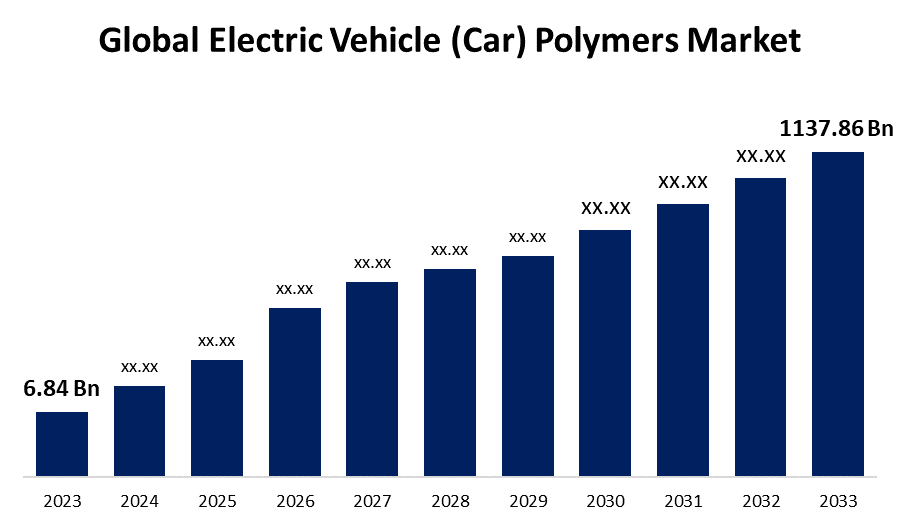Global Electric Vehicle (Car) Polymers Market Size, Share, and COVID-19 Impact Analysis, By Type (Elastomers, Engineering Plastics), By Component (Exterior, Interior, Powertrain System), and By Region (North America, Europe, Asia-Pacific, Latin America, Middle East, and Africa), Analysis and Forecast 2023 – 2033
Industry: Chemicals & MaterialsGlobal Electric Vehicle (Car) Polymers Market Insights Forecasts to 2032
- The Global Electric Vehicle (Car) Polymers Market Size was valued at USD 6.84 Billion in 2023.
- The Market Size is Growing at a CAGR of 66.76% from 2023 to 2033
- The Worldwide Electric Vehicle (Car) Polymers Market Size is expected to reach USD 1137.86 Billion by 2033
- North America is expected to Grow the fastest during the forecast period

Get more details on this report -
The Global Electric Vehicle (Car) Polymers Market size is anticipated to exceed USD 1137.86 Billion by 2033, Growing at a CAGR of 66.76% from 2023 to 2033.
Market Overview
Electric vehicles use plastics known as electric vehicle polymers to reduce weight while maintaining performance. Since polymers have many of the same properties as metals, such as heat resistance, abrasion resistance, stiffness, and toughness, they are the only materials capable of replacing metals. The replacement of metals with polymers is a key strategy used by electric vehicle manufacturers to reduce overall vehicle weight. Electric vehicle (car) polymers encompass a wide range of polymer materials used in the production and design of electric vehicles. Additionally, to their lower carbon emissions and ability to reduce reliance on fossil fuels, EV (car) polymers are becoming increasingly popular as the automotive industry shifts toward more environmentally friendly and sustainable transportation choices. Polymers, large molecules made up of repeating subunits, significantly improve the performance, efficiency, and overall sustainability of electric vehicles. Polymers play an important role in the development of lightweight materials used in electric vehicle applications. Significant growth in the automotive sector drives the global electric vehicle (car) polymers market. As governments around the world set ambitious targets to reduce carbon dioxide emissions, the automotive industry is under pressure to transition to cleaner and more sustainable technologies, which is significantly benefiting the global electric vehicle (car) polymers market. Polymers also help to improve the overall safety of EVs by absorbing energy during impacts and protecting occupants, which is driving up demand for electric vehicle (car) polymers. Furthermore, rapid advancements in battery technology are creating a favourable market environment.
Report Coverage
This research report categorizes the market for the global electric vehicle (car) polymers market based on various segments and regions forecasts revenue growth and analyzes trends in each submarket. The report analyses the key growth drivers, opportunities, and challenges influencing the global electric vehicle (car) polymers market. Recent market developments and competitive strategies such as expansion, product launch, and development, partnership, merger, and acquisition have been included to draw the competitive landscape in the market. The report strategically identifies and profiles the key market players and analyses their core competencies in each sub-segment of the global electric vehicle (car) polymers market.
Global Electric Vehicle (Car) Polymers Market Report Coverage
| Report Coverage | Details |
|---|---|
| Base Year: | 2023 |
| Market Size in 2023: | USD 6.84 Billion |
| Forecast Period: | 2023 - 2033 |
| Forecast Period CAGR 2023 - 2033 : | 66.76% |
| 2033 Value Projection: | USD 1137.86 Billion |
| Historical Data for: | 2019 - 2022 |
| No. of Pages: | 200 |
| Tables, Charts & Figures: | 110 |
| Segments covered: | By Type, By Component, By Region and COVID-19 Impact Analysis. |
| Companies covered:: | BASF, DowDuPont, Covestro, Celanese, SABIC, Solvay, LANXESS, LG Chem, Asahi Kasei, Evonik Industries, and Others |
| Pitfalls & Challenges: | COVID-19 Empact, Challenge, Future, Growth, & Analysis |
Get more details on this report -
Driving Factors
Furthermore, favourable government regulations as well as major investment in the development of charging infrastructure are expected to boost the growth of the global electric vehicle (car) polymer market. The rapid increase in demand for new electric car components is expected to drive market growth. Additionally, it is expected that the development of a diverse range of electric vehicles with cutting-edge features and innovations will increase demand for polymers, thereby supporting the global market for electric vehicle (car) polymers. Several governments are enacting strict regulations to reduce carbon emissions and combat climate change. These regulations are influencing the demand for lightweight and sustainable materials, such as polymers in EV manufacturing, because they improve vehicle energy efficiency and range, which benefits the market. Furthermore, the growing demand for electric vehicle batteries is driving up demand for electric vehicle (car) polymers. Connectors, sensors, wiring harnesses, and charging infrastructure are all essential components for electric vehicles. In addition, polymers with high electrical insulation, conductivity, and heat resistance are required to ensure the components' reliability and efficiency.
Restraining Factors
Millions of end-of-life vehicles (ELVs) are discarded and harm the environment, and recycling is difficult due to the wide range of polymers used in EVs. Several governments have enacted laws and regulations regarding polymer recycling. The high cost of technologies, sophisticated recycling facilities, and recycling regulations that restrict the use of polymers in EVs all contribute to the limited market growth for global electric vehicle (car) polymers. In contrast, the increased demand for technologically advanced polymers from electric car manufacturers will may hamper the growth of the global electric vehicle (car) polymer market during the forecast period.
Market Segmentation
The global electric vehicle (car) polymers market share is classified into type, and component.
- The elastomers segment is expected to grow fastest in the global electric vehicle (car) polymers market during the forecast period.
The global electric vehicle (car) polymers market is categorized by type into elastomers, engineering plastics. Among these, the elastomers segment is expected to grow fastest in the global electric vehicle (car) polymers market during the forecast period. Elastomers are important in the electric vehicle (EV) polymer industry because of their unique properties and versatility. Elastomers are a type of polymer known for their high elasticity and resilience, making them ideal for a variety of applications in EVs. Furthermore, the increasing use of polymers in electric vehicle components such as tires, gaskets, seals, and suspension systems are driving the market. In addition, elastomers have excellent sealing properties, ensuring effective insulation and protection for critical EV components. Elastomers are an important component in the advancement of electric vehicles, which is another factor driving growth.
- The interior segment is expected to grow at the highest pace in the global electric vehicle (car) polymers market during the forecast period.
Based on the component the global electric vehicle (car) polymers market is divided into exterior, interior, powertrain system. Among these, the interior segment is expected to grow at the highest pace in the global electric vehicle (car) polymers market during the forecast period. In response to the public's growing awareness of sustainability and the environment, interior components are increasingly popular. As governments and consumers become more concerned about climate change and carbon emissions, there has been a noticeable shift toward electric vehicles as a more environmentally friendly alternative to traditional internal combustion engine cars. This transition necessitates the creation of interior components that are lightweight, durable, and environmentally friendly.
Regional Segment Analysis of the Global Electric Vehicle (Car) Polymers Market
- North America (U.S., Canada, Mexico)
- Europe (Germany, France, U.K., Italy, Spain, Rest of Europe)
- Asia-Pacific (China, Japan, India, Rest of APAC)
- South America (Brazil and the Rest of South America)
- The Middle East and Africa (UAE, South Africa, Rest of MEA)
Asia-Pacific is anticipated to hold the largest share of the global electric vehicle (car) polymers market over the predicted timeframe.

Get more details on this report -
Asia-pacific is projected to hold the largest share of the global electric vehicle (car) polymers market over the predicted years. The growing adoption of electric vehicles in Asia Pacific is driving demand for lightweight and high-performance materials, such as polymers, to improve EV efficiency and range. Furthermore, rising consumer awareness of environmental sustainability and a desire to reduce carbon emissions are contributing to increased demand for electric vehicles, which in turn drives demand for polymers used in their manufacture.
North America is expected to grow fastest in the global electric vehicle (car) polymers market during the forecast period. Continuous advancements in polymer technology, such as improved durability, thermal stability, and electrical conductivity, are propelling the growth of the EV polymers industry in North America as manufacturers seek innovative materials to improve electric vehicle performance and efficiency. Polymers also help to improve the overall safety of EVs by absorbing energy during impacts and protecting occupants, which is driving up demand for electric vehicle (Car) polymers. Furthermore, rapid advancements in battery technology are creating a favourable market outlook in North America.
Competitive Analysis:
The report offers the appropriate analysis of the key organizations/companies involved in the global electric vehicle (car) polymers along with a comparative evaluation primarily based on their product offering, business overviews, geographic presence, enterprise strategies, segment market share, and SWOT analysis. The report also provides an elaborative analysis focusing on the current news and developments of the companies, which includes product development, innovations, joint ventures, partnerships, mergers & acquisitions, strategic alliances, and others. This allows for the evaluation of the overall competition within the market.
List of Key Companies
- BASF
- DowDuPont
- Covestro
- Celanese
- SABIC
- Solvay
- LANXESS
- LG Chem
- Asahi Kasei
- Evonik Industries
- Others
Key Target Audience
- Market Players
- Investors
- End-users
- Government Authorities
- Consulting And Research Firm
- Venture capitalists
- Value-Added Resellers (VARs)
Recent Developments
- In March 2022, BASF SE and Zhejian REEF Technology Co Ltd have signed an agreement to create cutting-edge recyclate formulations for use in the automotive, consumer, and packaging industries. In accordance with this agreement, BASF SE will provide technical support and consultancy for recycled polymer compositions tested at BASF test facilities, as well as its recently launched IrgaCycle additive products.
Market Segment
This study forecasts revenue at global, regional, and country levels from 2022 to 2033. Spherical Insights has segmented the Global Electric Vehicle (Car) Polymers Market based on the below-mentioned segments:
Global Electric Vehicle (Car) Polymers Market, By Type
- Elastomers
- Engineering Plastics
Global Electric Vehicle (Car) Polymers Market, By Component
- Exterior
- Interior
- Powertrain System
Global Electric Vehicle (Car) Polymers Market, By Region
- North America
- US
- Canada
- Mexico
- Europe
- Germany
- Uk
- France
- Italy
- Spain
- Russia
- Rest of Europe
- Asia Pacific
- China
- Japan
- India
- South Korea
- Australia
- Rest of Asia Pacific
- South America
- Brazil
- Argentina
- Rest of South America
- Middle East & Africa
- UAE
- Saudi Arabia
- Qatar
- South Africa
- Rest of the Middle East & Africa
Frequently Asked Questions (FAQ)
-
1. What are the driving factors for EV (cars) polymers market?The rising global demand for the environmentally friendly node of personal transportation has led to an increased demand for electric cars with better performance. To improve the performance of the EV cars, manufacturers are constantly trying to reduce the overall weight of the car. This has led to the growing demand for polymers in electric vehicles (cars).
-
2. Why polymers have importance in an electric vehicle?To make better-performing electric vehicles, car manufacturers need to reduce the overall weight of the vehicle. So that less energy may be consumed in driving the car. Polymers help in replacing major metal components of the car without sacrificing the strength or build quality of the cars.
-
3. What are the opportunities for the EV polymer market?Usage of polymers in new components such as roof panel, battery cases, and others.
Need help to buy this report?